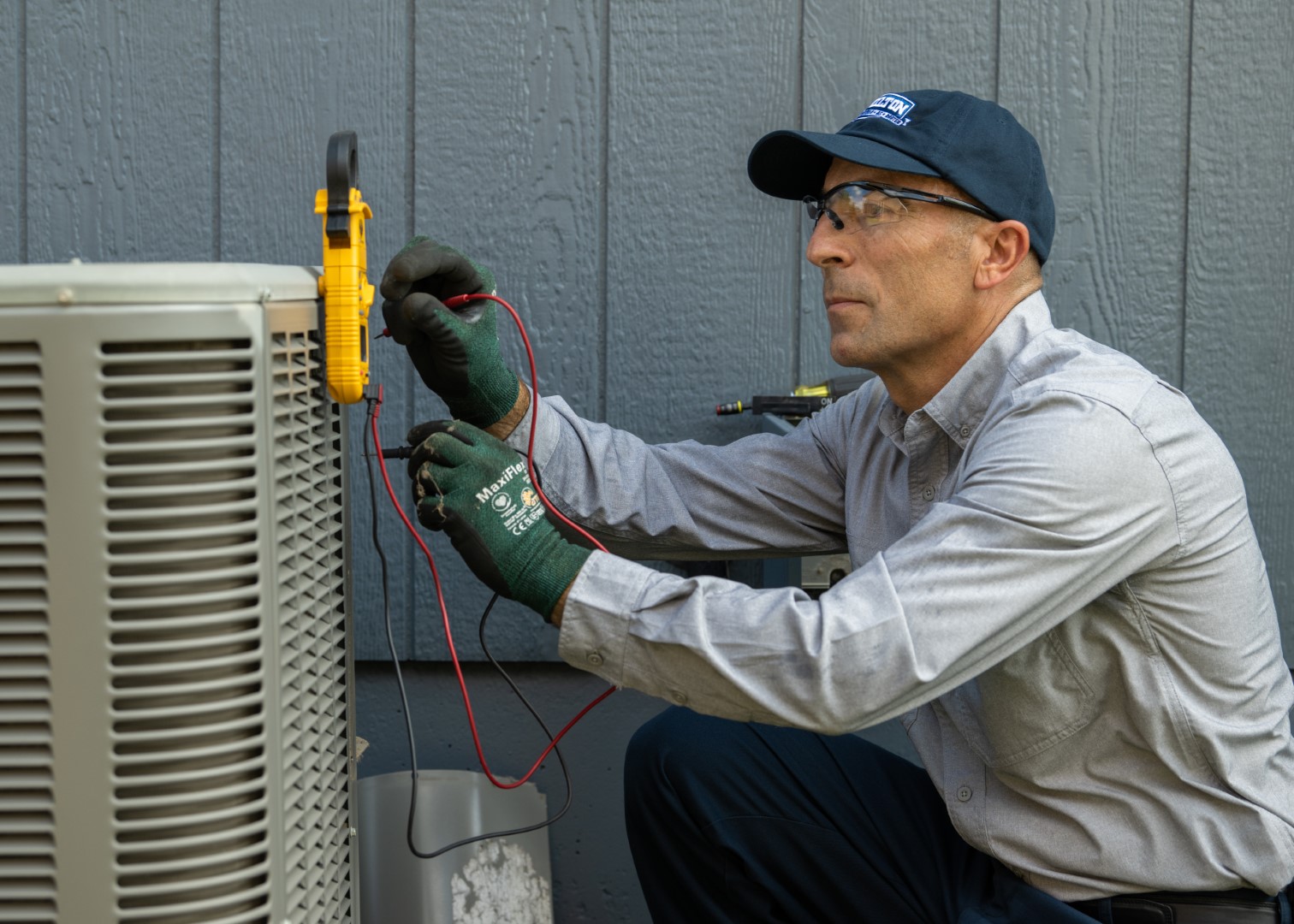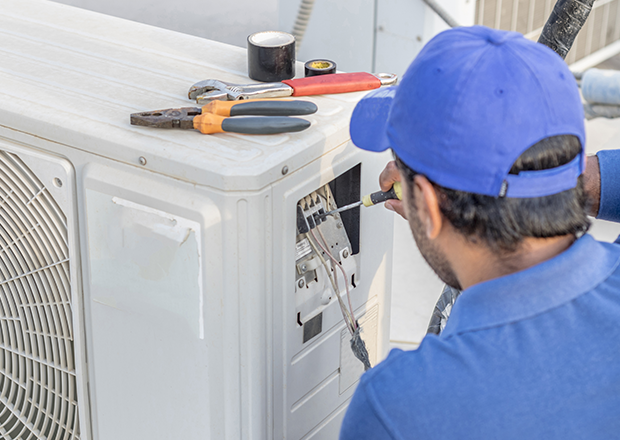How an HVAC company helps improve energy efficiency
Everything about Cooling And Heating: Identifying Common Issues and Effective AC Repair Methods
A/c systems are essential for preserving indoor comfort. Recognizing their parts and performance is crucial for recognizing typical problems. Home owners usually face troubles such as ineffective air conditioning, odd smells, or rising energy costs. These indications can suggest underlying problems that may need interest. Exploring DIY troubleshooting methods can be helpful, yet understanding when to seek professional help is just as vital. What steps can be required to guarantee resilient efficiency?
Recognizing Your Heating And Cooling System: Elements and Functionality
An a/c system, often considered the backbone of interior environment control, consists of numerous crucial components that interact to regulate temperature and air top quality. The key components include the heating system, air flow system, and air conditioning device. The home heating system, commonly a furnace or boiler, creates heat during cooler months, while the cooling system cools interior rooms during the summer.

Common Cooling And Heating Issues House Owners Experience
House owners usually encounter a number of typical cooling and heating troubles, consisting of inconsistent temperature level distribution throughout their space. In addition, unusual noises throughout procedure can show underlying issues that require interest. Addressing these problems immediately is crucial for maintaining ideal system performance.
Inconsistent Temperature Level Circulation
Numerous families experience the irritating concern of inconsistent temperature distribution, where certain areas feel uncomfortably cozy while others continue to be also chilly. This trouble usually occurs from a range of variables, including bad insulation, blocked vents, or an improperly sized heating and cooling system. When ducts are not properly sealed or when furniture blocks air flow, some spaces might get insufficient cooling. Additionally, thermostat positioning can greatly affect temperature regulation; a thermostat located in a sunlit area might misstate the general temperature level of your home. Routine maintenance, consisting of cleaning filters and making certain ductwork is clear, can assist minimize these disparities. House owners might likewise consider zoning systems to better control temperatures throughout various locations of the home, advertising an extra comfy living environment.
Uncommon Sounds Throughout Procedure
When a cooling and heating system operates, unusual noises can show underlying concerns that require attention. Property owners may run into an array of sounds, such as grinding, squeaking, or hissing. Grinding noises typically indicate damaged bearings or parts, while squealing can recommend loosened belts or parts requiring lubrication. Hissing might indicate a refrigerant leak, which can compromise the system's efficiency. Additionally, banging audios may aim to loose ductwork or an issue with the blower follower. Each of these sounds works as a warning, triggering house owners to check out further. Neglecting these indicators can result in more considerable troubles and pricey repair services. Routine maintenance and timely interest to uncommon sounds can improve system longevity and performance, ensuring a comfy living setting.
Indicators That Indicate Your AC Requirements Repair Service
How can one tell if their cooling unit needs repair? Numerous signs may show underlying concerns requiring specialist attention. First, if the air conditioner falls short to cool down the area successfully, it might recommend a cooling agent leakage or compressor malfunction. Furthermore, an increase in energy bills without corresponding use adjustments might signal inefficiency in the system. Home owners should also be alert to unusual scents rising from the unit, which can show mold growth or electrical concerns. If the Air conditioner frequently cycles on and off, it might be an indication of a damaged thermostat or other mechanical troubles. Lastly, the visibility of water merging around the unit can show a clogged drain line. Acknowledging these signs early can save money and time, making certain that the cooling system operates successfully and effectively.
DIY Troubleshooting Techniques for Cooling And Heating Issues
When encountering heating and cooling concerns, homeowners can utilize a number of do it yourself fixing strategies to determine the trouble. Key techniques include checking thermostat settings, evaluating air filters, and reviewing drainage issues. These steps can help determine common breakdowns prior to looking for professional assistance.
Inspecting Thermostat Settings
What steps should house owners take to ensure their thermostat settings are correct? They must validate the thermostat is set to the preferred temperature and setting, whether home heating or air conditioning. Looking for a clear display and validating the thermostat is not set to "hold" or "getaway" setting is vital. House owners must likewise verify that the thermostat is degree and set up in a place devoid of drafts, direct sunlight, furnace service near me or other temperature affects. In addition, rectifying the thermostat can help supply precise analyses. If the thermostat operates batteries, changing them might settle any type of concerns. By systematically examining these variables, homeowners can often identify and rectify thermostat-related troubles, advertising optimal heating and cooling system performance.
Inspecting Air Filters
Air filters play an important duty in preserving excellent HVAC performance. They catch dirt, allergens, and other bits, guaranteeing tidy air flow. With residential hvac systems time, filters can end up being blocked, decreasing air flow and effectiveness. To inspect air filters, individuals should initially locate the filter, often found in the return air duct or near the heating system. As soon as located, they should assess the filter's condition-- if it appears dirty or blemished, it most likely needs replacement. The majority of filters call for altering every 1-3 months, relying on use and environmental factors. Normal evaluation and prompt replacement of air filters not just enhance air high quality however additionally lengthen the life-span of HVAC systems, preventing prospective breakdowns and pricey repair services.
Evaluating Drainage Issues
Just how can house owners efficiently determine and attend to drain concerns within their heating and cooling systems? First, they must examine the condensate drain line for blockages or obstructions, which can bring about water build-up. Homeowners may use a wet/dry vacuum cleaner to clear any kind of debris obstructing the line. Next, checking the drain frying pan for corrosion or leakages is important, as a damaged pan can cause water to overflow. Normal cleaning of the drain line with a mixture of vinegar and water assists prevent future obstructions. In addition, ensuring appropriate slope of the drain line advertises efficient water circulation. If these DIY strategies do not fix the concern, seeking advice from a specialist a/c specialist might be essential to avoid possible water damage and system failing.
When to Call an Expert for Air Conditioner Repair Work

While some air conditioner problems can be dealt with with do it yourself methods, there are scenarios where calling a professional comes to be essential. Property owners should look for expert assistance when they come across persistent issues, such as insufficient air conditioning, unusual noises, or unusual odors rising from the unit. These signs may suggest deeper problems that call for specialized understanding and devices to detect and repair properly.

Preventative Maintenance Tips for A/c Longevity
Regular preventative upkeep can significantly enhance the longevity of HVAC systems. Home owners should arrange yearly inspections by licensed professionals to assess system performance and recognize prospective problems. Regularly changing or cleaning air filters is vital, as this assurances appropriate air movement and minimizes stress on the system. In addition, examining and sealing ductwork stops power loss and boosts total performance.
It is additionally advisable to keep the outdoor system clear of debris and greenery, allowing for peak airflow and warm exchange. House owners must inspect the condensate drainpipe for blockages to stay clear of water damage and mold and mildew development. In addition, keeping appropriate thermostat setups and utilizing programmable alternatives can enhance power effectiveness. Lastly, recording maintenance tasks assists track service history and can assist in determining recurring problems (HVAC contractor). By complying with these preventative actions, people can make best use of the effectiveness and life expectancy of their cooling and heating systems
Regularly Asked Inquiries
Exactly how Usually Should I Change My A/c System Filters?
HVAC system filters should typically be replaced every one to three months, depending upon usage, filter type, and environmental factors. Regular replacement assists preserve efficiency and air quality, ensuring peak system efficiency throughout the year.
What Dimension Heating And Cooling System Do I Required for My Home?
To figure out the suitable a/c system size for a home, one need to take into consideration square video footage, insulation top quality, and neighborhood environment. Consulting a specialist can help assure maximum efficiency and convenience for the certain living space.
Are There Eco-Friendly Heating And Cooling Options Available?
Yes, eco-friendly HVAC options are offered, consisting of energy-efficient heatpump, solar-powered systems, and geothermal home heating. These choices reduce energy usage and ecological influence, promoting sustainability while keeping reliable climate control for household and business spaces.
Just How Can I Enhance My cooling and heating System's Power Effectiveness?
To boost a/c power performance, one can on a regular basis maintain the system, seal air leaks, set up programmable thermostats, make use of energy-efficient filters, and assurance ample insulation throughout the home to lower energy consumption and enhance efficiency.

What Is the Ordinary Lifespan of an A/c System?
The average lifespan of a HVAC system typically varies from 15 to 25 years, depending on factors such as upkeep, usage, and the quality of setup. Normal maintenance can greatly extend its operational durability.
Conclusion
In summary, a complete understanding of heating and cooling systems encourages home owners to recognize common problems and address minor problems efficiently. Identifying signs of malfunction, using DIY fixing methods, and prioritizing routine upkeep can boost system performance and effectiveness. When faced with complex repairs, enlisting professional help is crucial to assure safety and longevity. By cultivating understanding and proactive care, individuals can appreciate a comfortable interior setting while decreasing unanticipated prices related to HVAC failures.